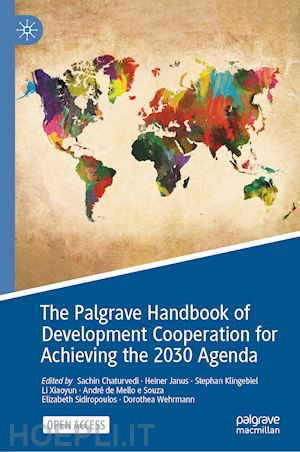
Questo prodotto usufruisce delle SPEDIZIONI GRATIS
selezionando l'opzione Corriere Veloce in fase di ordine.
Pagabile anche con Carta della cultura giovani e del merito, 18App Bonus Cultura e Carta del Docente
Section 1: Changing Context of Development Cooperation - Current Narratives and Trends
Sachin Chaturvedi is Director General at the Research and Information System for Developing Countries (RIS), a New Delhi, India-based think tank.
Heiner Janus is a researcher in the Inter- and Transnational Cooperation programme at the German Development Institute.
Stephan Klingebiel is Chair of the Inter- and Transnational Cooperation programme at the German Development Institute and Senior Lecturer at the University of Marburg, Germany.
Xiaoyun Li is Chair Professor at China Agricultural University and Honorary Dean of the China Institute for South-South Cooperation in Agriculture. Prof. Li is the Chair of the Network of Southern Think Tanks and Chair of the China International Development Research Network.
André de Mello e Souza is a researcher at the Institute for Applied Economic Research (IPEA), a Brazilian governmental think tank.
Elizabeth Sidiropoulos is Chief Executive of the South African Institute of International Affairs. She has co-edited Development Cooperation and Emerging Powers: New Partners or Old Patterns (2012) and Institutional Architecture and Development: Responses from Emerging Powers (2015).
Dorothea Wehrmann is a researcher in the Inter- and Transnational Cooperation programme at the German Development Institute.











Il sito utilizza cookie ed altri strumenti di tracciamento che raccolgono informazioni dal dispositivo dell’utente. Oltre ai cookie tecnici ed analitici aggregati, strettamente necessari per il funzionamento di questo sito web, previo consenso dell’utente possono essere installati cookie di profilazione e marketing e cookie dei social media. Cliccando su “Accetto tutti i cookie” saranno attivate tutte le categorie di cookie. Per accettare solo deterninate categorie di cookie, cliccare invece su “Impostazioni cookie”. Chiudendo il banner o continuando a navigare saranno installati solo cookie tecnici. Per maggiori dettagli, consultare la Cookie Policy.